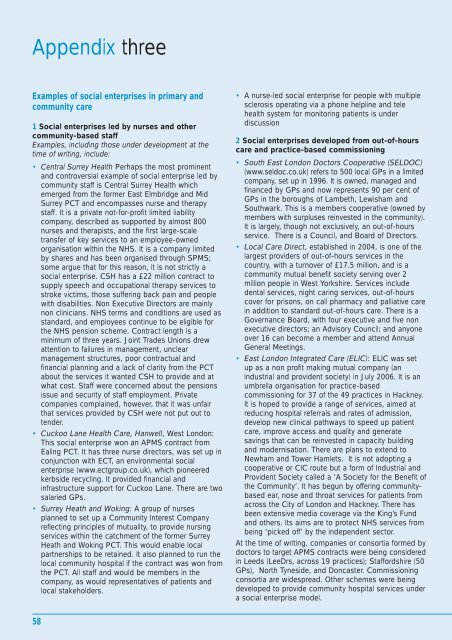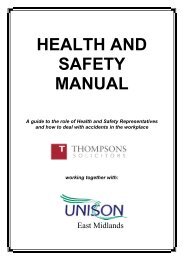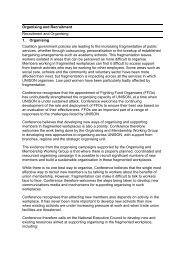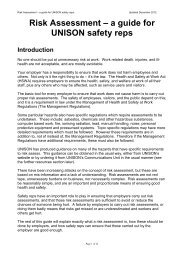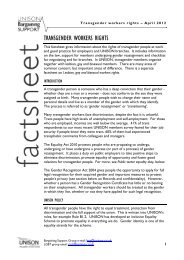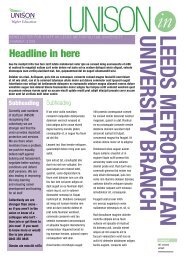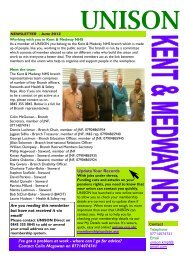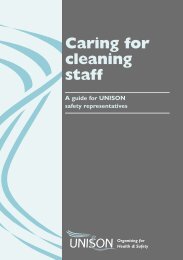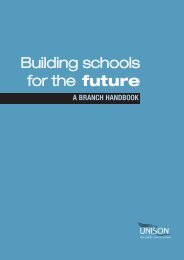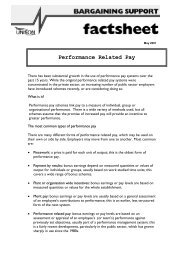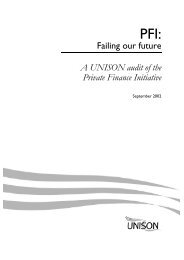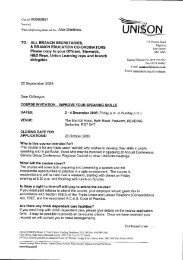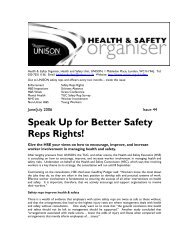Social Enterprises and the NHS - Unison
Social Enterprises and the NHS - Unison
Social Enterprises and the NHS - Unison
Create successful ePaper yourself
Turn your PDF publications into a flip-book with our unique Google optimized e-Paper software.
Appendix three<br />
Examples of social enterprises in primary <strong>and</strong><br />
community care<br />
1 <strong>Social</strong> enterprises led by nurses <strong>and</strong> o<strong>the</strong>r<br />
community-based staff<br />
Examples, including those under development at <strong>the</strong><br />
time of writing, include:<br />
• Central Surrey Health Perhaps <strong>the</strong> most prominent<br />
<strong>and</strong> controversial example of social enterprise led by<br />
community staff is Central Surrey Health which<br />
emerged from <strong>the</strong> former East Elmbridge <strong>and</strong> Mid<br />
Surrey PCT <strong>and</strong> encompasses nurse <strong>and</strong> <strong>the</strong>rapy<br />
staff. It is a private not-for-profit limited liability<br />
company, described as supported by almost 800<br />
nurses <strong>and</strong> <strong>the</strong>rapists, <strong>and</strong> <strong>the</strong> first large-scale<br />
transfer of key services to an employee-owned<br />
organisation within <strong>the</strong> <strong>NHS</strong>. It is a company limited<br />
by shares <strong>and</strong> has been organised through SPMS;<br />
some argue that for this reason, it is not strictly a<br />
social enterprise. CSH has a £22 million contract to<br />
supply speech <strong>and</strong> occupational <strong>the</strong>rapy services to<br />
stroke victims, those suffering back pain <strong>and</strong> people<br />
with disabilities. Non Executive Directors are mainly<br />
non clinicians. <strong>NHS</strong> terms <strong>and</strong> conditions are used as<br />
st<strong>and</strong>ard, <strong>and</strong> employees continue to be eligible for<br />
<strong>the</strong> <strong>NHS</strong> pension scheme. Contract length is a<br />
minimum of three years. Joint Trades Unions drew<br />
attention to failures in management, unclear<br />
management structures, poor contractual <strong>and</strong><br />
financial planning <strong>and</strong> a lack of clarity from <strong>the</strong> PCT<br />
about <strong>the</strong> services it wanted CSH to provide <strong>and</strong> at<br />
what cost. Staff were concerned about <strong>the</strong> pensions<br />
issue <strong>and</strong> security of staff employment. Private<br />
companies complained, however, that it was unfair<br />
that services provided by CSH were not put out to<br />
tender.<br />
• Cuckoo Lane Health Care, Hanwell, West London:<br />
This social enterprise won an APMS contract from<br />
Ealing PCT. It has three nurse directors, was set up in<br />
conjunction with ECT, an environmental social<br />
enterprise (www.ectgroup.co.uk), which pioneered<br />
kerbside recycling. It provided financial <strong>and</strong><br />
infrastructure support for Cuckoo Lane. There are two<br />
salaried GPs.<br />
• Surrey Heath <strong>and</strong> Woking: A group of nurses<br />
planned to set up a Community Interest Company<br />
reflecting principles of mutuality, to provide nursing<br />
services within <strong>the</strong> catchment of <strong>the</strong> former Surrey<br />
Heath <strong>and</strong> Woking PCT. This would enable local<br />
partnerships to be retained. It also planned to run <strong>the</strong><br />
local community hospital if <strong>the</strong> contract was won from<br />
<strong>the</strong> PCT. All staff <strong>and</strong> would be members in <strong>the</strong><br />
company, as would representatives of patients <strong>and</strong><br />
local stakeholders.<br />
58<br />
• A nurse-led social enterprise for people with multiple<br />
sclerosis operating via a phone helpline <strong>and</strong> tele<br />
health system for monitoring patients is under<br />
discussion<br />
2 <strong>Social</strong> enterprises developed from out-of-hours<br />
care <strong>and</strong> practice-based commissioning<br />
• South East London Doctors Cooperative (SELDOC)<br />
(www.seldoc.co.uk) refers to 500 local GPs in a limited<br />
company, set up in 1996. It is owned, managed <strong>and</strong><br />
financed by GPs <strong>and</strong> now represents 90 per cent of<br />
GPs in <strong>the</strong> boroughs of Lambeth, Lewisham <strong>and</strong><br />
Southwark. This is a members cooperative (owned by<br />
members with surpluses reinvested in <strong>the</strong> community).<br />
It is largely, though not exclusively, an out-of-hours<br />
service. There is a Council, <strong>and</strong> Board of Directors.<br />
• Local Care Direct, established in 2004, is one of <strong>the</strong><br />
largest providers of out-of-hours services in <strong>the</strong><br />
country, with a turnover of £17.5 million, <strong>and</strong> is a<br />
community mutual benefit society serving over 2<br />
million people in West Yorkshire. Services include<br />
dental services, night caring services, out-of-hours<br />
cover for prisons, on call pharmacy <strong>and</strong> palliative care<br />
in addition to st<strong>and</strong>ard out-of-hours care. There is a<br />
Governance Board, with four executive <strong>and</strong> five non<br />
executive directors; an Advisory Council; <strong>and</strong> anyone<br />
over 16 can become a member <strong>and</strong> attend Annual<br />
General Meetings.<br />
• East London Integrated Care (ELIC): ELIC was set<br />
up as a non profit making mutual company (an<br />
industrial <strong>and</strong> provident society) in July 2006. It is an<br />
umbrella organisation for practice-based<br />
commissioning for 37 of <strong>the</strong> 49 practices in Hackney.<br />
It is hoped to provide a range of services, aimed at<br />
reducing hospital referrals <strong>and</strong> rates of admission,<br />
develop new clinical pathways to speed up patient<br />
care, improve access <strong>and</strong> quality <strong>and</strong> generate<br />
savings that can be reinvested in capacity building<br />
<strong>and</strong> modernisation. There are plans to extend to<br />
Newham <strong>and</strong> Tower Hamlets. It is not adopting a<br />
cooperative or CIC route but a form of Industrial <strong>and</strong><br />
Provident Society called a ‘A Society for <strong>the</strong> Benefit of<br />
<strong>the</strong> Community’. It has begun by offering communitybased<br />
ear, nose <strong>and</strong> throat services for patients from<br />
across <strong>the</strong> City of London <strong>and</strong> Hackney. There has<br />
been extensive media coverage via <strong>the</strong> King’s Fund<br />
<strong>and</strong> o<strong>the</strong>rs. Its aims are to protect <strong>NHS</strong> services from<br />
being ‘picked off’ by <strong>the</strong> independent sector.<br />
At <strong>the</strong> time of writing, companies or consortia formed by<br />
doctors to target APMS contracts were being considered<br />
in Leeds (LeeDrs, across 19 practices); Staffordshire (50<br />
GPs), North Tyneside, <strong>and</strong> Doncaster. Commissioning<br />
consortia are widespread. O<strong>the</strong>r schemes were being<br />
developed to provide community hospital services under<br />
a social enterprise model.


